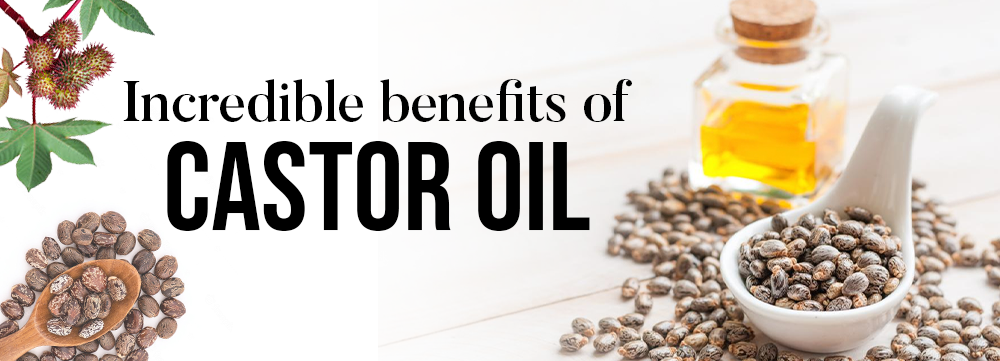Castor oil is a clear pale yellow, odorless oil, obtained from castor-bean seeds of the castor plant. Castor plant is found in most of the tropical regions of the world but mainly in the tropics of Asia (mainly India) and Africa. Castor oil is chiefly used for its laxative properties, however it has a wide range of health benefits. Castor oil also finds use in cosmetic industry due to its benefits for skin and hair.
Traditionally castor oil was used for its laxative effects, anti-inflammatory properties and its ability to help in induction of labor.
Castor oil contains omega-9 and omega-6 fatty acids. Ricinoleic acid (an omega-9 fatty acid), forms 90% of castor oil’s fatty acid content. Research suggests that omega-9 has pain relief and anti-inflammatory properties. Local application of castor oil can help reduce joint pains and menstrual cramps.
Castor oil is mainly used in the manufacturing of soaps, in hard candies, in supplementary vitamins and mineral oral tablets as an ingredient for protective coatings. It is also found in over-the-counter oral liquids as a stimulant laxative. It is added in commercial cosmetic, hair and skincare products.
The oil is very thick and also has a strong odor, which makes it hard to swallow or apply on skin and hair. It can, therefore, be added with other liquids, such as water, fruit juice or milk, for oral consumption. It can also be mixed with other oils such as coconut oil, olive or groundnut oil for oral consumption and also for local application.

Laxative Properties: Castor oil has always been used for its laxative properties. It helps to stimulate digestion and relieves constipation. Ricinoleic acid helps to improve peristaltic movements in the small intestine. Due to this reason, castor oil is used as a stimulant laxative for constipation even in chronic constipation and also for bowel evacuation.
Induction of Labor: Similar to its effect on small intestine, castor oil also stimulates contraction of the uterine muscles, thereby helping in the induction of labor. In a study, castor oil cocktail consumption, induced labor easily in 92% of women, with maximal vaginal births and there were little or no maternal fetal complications.
Anti-Inflammatory Benefits: Studies have shown that ricinoleic acid in castor oil is effective in reducing swelling and pain which is caused by inflammation. Research also found that local application of castor oil may reduce joint pain and symptoms of arthritis.
Wound Healing: Fatty acids found in castor oil have anti-bacterial and antimicrobial properties. Its application on wounds may reduce inflammation, improve blood-flow locally and prevent further infection. It also helps to shed damaged skin cells from the wound area, thereby helping in the healing process.

The fatty acids of castor oil act as humectants (substances that attract water from the atmosphere) and therefore keep the skin hydrated and moisturized. This affect promotes good skin health, soothes inflammation and relieves dryness.
Due to castor oil’s anti-bacterial, anti-inflammatory and moisturizing properties, it helps to treat some causes of acne. It also helps to protect the skin from bacterial and fungal infections.
As castor oil has a low comedogenic (blocking) score, so it is unlikely to clog pores in the skin and reduces the risk of developing blackheads. It may also be helpful in the treatment of melasma (black spots on the skin) and ringworm.
As castor oil is rich in fatty acid, (ricinoleic acid), it helps to promote the growth of healthy skin tissues, helping in restoring uneven skin tones.
Castor oil, due to its fatty acid content, enhances smoothness and softness of skin upon regular application.
As castor oil act as an humectant, it provides hydration to the scalp and the hair and helps to seal moisture and natural oils in the hair strands. These properties make it the best choice for dry and damages hair.
Due to its fatty acid content, it acts as a natural conditioner for the hair and keeps them soft, healthy and shiny.
As castor oil has antifungal and antibacterial effects, it is useful in the treatment of stubborn dandruff, especially caused due to Seborrheic dermatitis.
Castor oil keeps the hair follicles nourished and hydrated, increasing blood circulation to the scalp and thereby boosting hair growth.

Adverse effects of Castor Oil Consumption:
- Some people may get feelings of bloating, nausea, vomiting and dizziness on consumption of castor oil.
- It is not advisable to consume castor oil during pregnancy as it may cause premature contractions.
- It is advised to monitor electrolyte and acid-base balance with consumption of laxatives. These imbalances may occur due to loss of water and electrolytes.
- People may also show signs of weakness, sleepiness, vomiting and sometimes rapid breathing after unregulated consumption of castor oil.
- Patients of anorexia nervosa and bulimia are especially at risk as they may try to lose weight through castor oil (laxative) overdose.
Due to its natural properties, castor oil can be the preferred choice by many but it is best to consume castor oil under supervision of an expert.
Ms Sunita Roy Chowdhury, Senior Nutritionist, Dietician and Nutrition Educator
Healthynudgez and Guiding Stars Open Learning Academy,
Under the banner of SS Guiding Stars Pvt. Ltd.
Disclaimer
At multano we are passionate about helping people make their lives healthier and happier. All information provided in this article is researched and authenticated by qualified experts. We are dedicated to providing reliable and accurate information to our readers. However, please use the information provided here with discretion. Any changes in medication/diet must be done with the approval of your treating medical practitioner/Dietician only.


